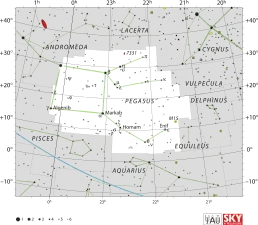سعد المطر
أو إيتا الفرس الأعظم Eta Pegasi اسمه التقليدي Matar مشتق من الاسم العربي. و هو نجم ثنائي في كوكبة الفرس الأعظم.
| سعد المطر | |
|---|---|
 سعد المطر في كوكبة الأعظم - النقطة الحمراء (η) | |
| معلومات الرصد حقبة حقبة اعتدالان حقبة | |
| كوكبة | الفرس الأعظم |
| مطلع مستقيم | 22س 43د 00.13743ث[1] |
| الميل | ° +30 ′13 ″16.4822[1] |
| القدر الظاهري (V) | +2.95[2] |
| الخصائص | |
| نوع الطيف | G2 II + F0 V[3] |
| U−B مؤشر اللون | +0.57[2] |
| B−V مؤشر اللون | +0.86[2] |
| القياسات الفلكية | |
| السرعة الشعاعية (Rv) | +4.3[4] كم/ث |
| الحركة الخاصة (μ) | –100.06[1]+15.46[1] |
| التزيح (π) | 19.51 ± 0.18 د.ق |
| البعد | 167 ± 2 س.ض (51٫3 ± 0٫5 ف.ف) |
| القدر المطلق (MV) | –1.18[5] |
| المدار | |
| الشذوذ المداري (e) | 0.183 |
| القبا عصر (T) | 2452025 HJD |
| البعد الزاوي الحضيضي (ω) (ثانوي) |
344.7° |
| نصف-مطال (K1) (أساسي) |
14.37 كم/ث |
| تفاصيل | |
| η Peg A | |
| كتلة | 3.82 ± 0.52[6] ك☉ |
| نصف قطر | 18[7] نق☉ |
| ضياء | 247[6] ض☉ |
| جاذبية سطحية (log g) | 2.40[8] سم.غ.ثا |
| درجة الحرارة | 5,450[6] ك |
| معدنية (فلك) [Fe/H] | +0.39[8] dex |
| دوران | 818[5] |
| سرعة الدوران (v sin i) | 1.4[9] كم/ثا |
| تسميات اخرى | |
| Matar, 44 Peg, فهرس النجوم الأساسية 857, فهرس هنري درابر 215182, هيباركوس 112158, فهرس النجوم 8650, فهرس النجوم 90734.[10] | |
ينتمي سعد المطر إلى الفئة الطيفية G2II-III و يملك قدر ظاهري 3.1+ و يبعد 215 سنة ضوئية عن الأرض. أما رفيقه ينتمي إلى الفئة الطيفية F0V . ضياء النجم الرئيسي يصل إلأى 262 ضعف من ضياء الشمس. يحتمل أن يكون سعد المطر عبارة عن مجموعة رباعية النجوم حيث أن النجمين الآخرين ذو ضياء قليل.[11]
المراجع
- van Leeuwen, F. (نوفمبر 2007)، "Validation of the new Hipparcos reduction"، Astronomy and Astrophysics، 474 (2): 653–664، arXiv:0708.1752، Bibcode:2007A&A...474..653V، doi:10.1051/0004-6361:20078357.
- Johnson, H. L.؛ وآخرون (1966)، "UBVRIJKL photometry of the bright stars"، Communications of the Lunar and Planetary Laboratory، 4 (99): 99، Bibcode:1966CoLPL...4...99J.
- Parsons, Sidney B.؛ Ake, Thomas B. (نوفمبر 1998)، "Ultraviolet and Optical Studies of Binaries with Luminous Cool Primaries and Hot Companions. V. The Entire IUE Sample"، The Astrophysical Journal Supplement Series، 119 (1): 83–104، Bibcode:1998ApJS..119...83P، doi:10.1086/313152
- Wilson, Ralph Elmer (1953)، General Catalogue of Stellar Radial Velocities، Washington: Carnegie Institution of Washington، Bibcode:1953QB901.W495......
- Pizzolato, N.؛ Maggio, A.؛ Sciortino, S. (سبتمبر 2000)، "Evolution of X-ray activity of 1-3 Msun late-type stars in early post-main-sequence phases"، Astronomy and Astrophysics، 361: 614–628، Bibcode:2000A&A...361..614P
- Hohle, M. M.؛ Neuhäuser, R.؛ Schutz, B. F. (أبريل 2010)، "Masses and luminosities of O- and B-type stars and red supergiants"، Astronomische Nachrichten، 331 (4): 349، arXiv:1003.2335، Bibcode:2010AN....331..349H، doi:10.1002/asna.200911355
- Lang, Kenneth R. (2006)، Astrophysical formulae، Astronomy and astrophysics library (ط. 3)، Birkhäuser، ج. 1، ISBN 3-540-29692-1. The radius (R*) is given by:
- Luck, R. Earle؛ Wepfer, Gordon G. (نوفمبر 1995)، "Chemical Abundances for F and G Luminosity Class II Stars"، Astronomical Journal، 110: 2425، Bibcode:1995AJ....110.2425L، doi:10.1086/117702
- Massarotti, Alessandro؛ وآخرون (يناير 2008)، "Rotational and Radial Velocities for a Sample of 761 HIPPARCOS Giants and the Role of Binarity"، The Astronomical Journal، 135 (1): 209–231، Bibcode:2008AJ....135..209M، doi:10.1088/0004-6256/135/1/209
- "MATAR -- Star in double system"، SIMBAD Astronomical Object Database، Centre de Données astronomiques de Strasbourg، مؤرشف من الأصل في 11 يناير 2020، اطلع عليه بتاريخ 03 مارس 2012
- "Tabulae Astronomicae" (1727), see star table, page 13. [وصلة مكسورة] نسخة محفوظة 26 يناير 2020 على موقع واي باك مشين.
- بوابة نجوم
- بوابة علم الفلك
This article is issued from Wikipedia. The text is licensed under Creative Commons - Attribution - Sharealike. Additional terms may apply for the media files.